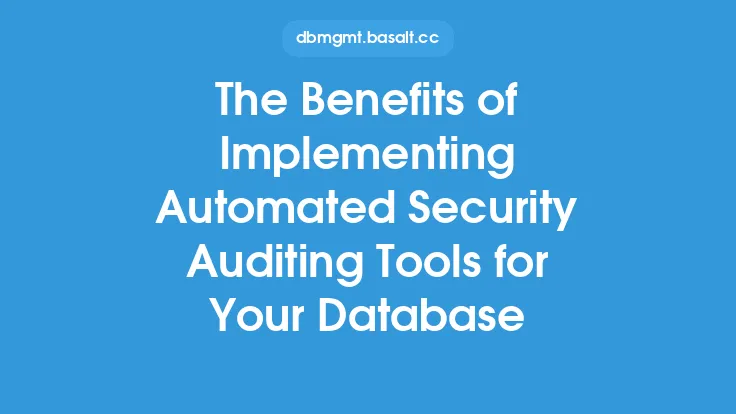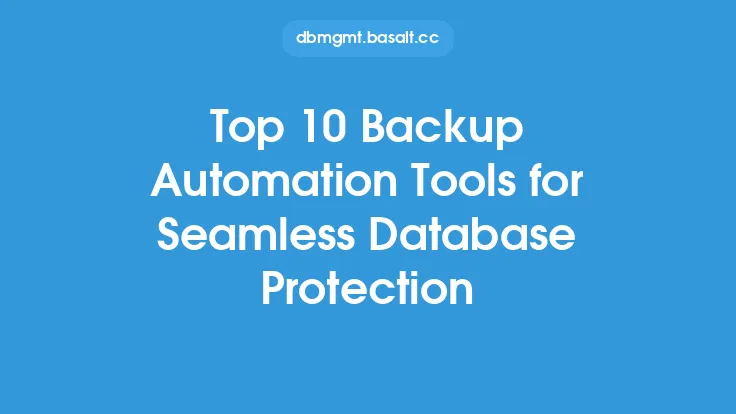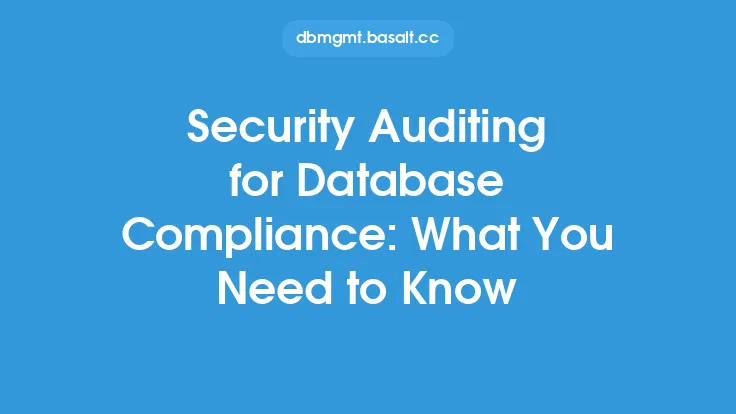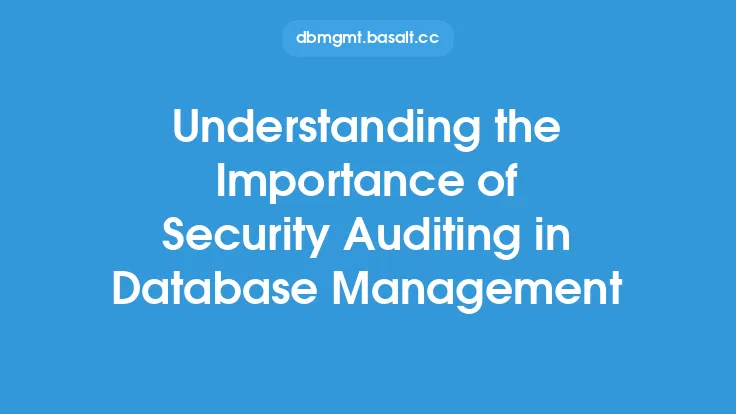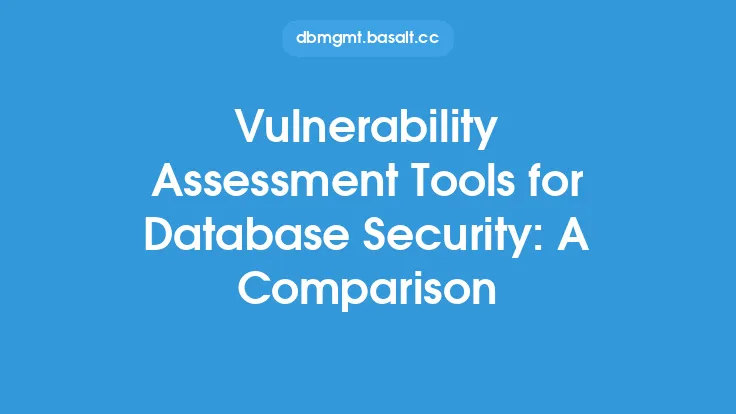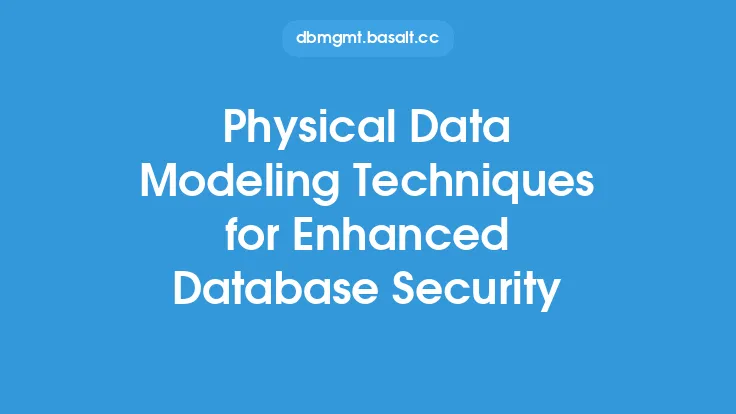Database auditing is a critical component of database administration, as it helps ensure the security, integrity, and compliance of an organization's data. With the increasing number of cyber threats and data breaches, it's essential to have a robust database auditing system in place. One of the key aspects of database auditing is the use of specialized tools that can help monitor, track, and analyze database activities. In this article, we'll explore the top database auditing tools that can enhance the security of your database.
Introduction to Database Auditing Tools
Database auditing tools are software applications that help monitor and track database activities, such as login attempts, queries, and data modifications. These tools can help identify potential security threats, detect unauthorized access, and ensure compliance with regulatory requirements. There are various types of database auditing tools available, including native auditing tools, third-party tools, and cloud-based tools. Native auditing tools are built into the database management system, while third-party tools are developed by external vendors. Cloud-based tools, on the other hand, are hosted in the cloud and can be accessed through a web interface.
Types of Database Auditing Tools
There are several types of database auditing tools available, each with its own strengths and weaknesses. Some of the most common types of database auditing tools include:
- Native Auditing Tools: These tools are built into the database management system and provide basic auditing capabilities. Examples of native auditing tools include Oracle's Auditing feature and Microsoft SQL Server's SQL Server Audit.
- Third-Party Auditing Tools: These tools are developed by external vendors and provide advanced auditing capabilities. Examples of third-party auditing tools include IBM InfoSphere Guardium and Imperva SecureSphere.
- Cloud-Based Auditing Tools: These tools are hosted in the cloud and provide real-time auditing capabilities. Examples of cloud-based auditing tools include AWS Database Activity Monitoring and Google Cloud SQL Audit Logging.
- Open-Source Auditing Tools: These tools are free and open-source, providing basic auditing capabilities. Examples of open-source auditing tools include MySQL Enterprise Audit and PostgreSQL Audit.
Key Features of Database Auditing Tools
When selecting a database auditing tool, there are several key features to consider. Some of the most important features include:
- Real-Time Monitoring: The ability to monitor database activities in real-time, providing immediate alerts and notifications.
- Audit Trail: The ability to track and record all database activities, including login attempts, queries, and data modifications.
- Compliance Reporting: The ability to generate reports that meet regulatory requirements, such as SOX, HIPAA, and PCI-DSS.
- Alerting and Notification: The ability to send alerts and notifications to administrators and security teams in case of suspicious activity.
- Data Analytics: The ability to analyze database activities and provide insights into database performance and security.
Top Database Auditing Tools
Some of the top database auditing tools available include:
- IBM InfoSphere Guardium: A comprehensive database auditing tool that provides real-time monitoring, audit trail, and compliance reporting.
- Imperva SecureSphere: A database auditing tool that provides advanced threat detection and prevention capabilities.
- Oracle Audit Vault: A database auditing tool that provides real-time monitoring, audit trail, and compliance reporting.
- Microsoft SQL Server Audit: A native auditing tool that provides basic auditing capabilities, including audit trail and compliance reporting.
- AWS Database Activity Monitoring: A cloud-based auditing tool that provides real-time monitoring and audit trail.
Benefits of Using Database Auditing Tools
Using database auditing tools can provide several benefits, including:
- Improved Security: Database auditing tools can help detect and prevent unauthorized access, reducing the risk of data breaches.
- Compliance: Database auditing tools can help ensure compliance with regulatory requirements, reducing the risk of fines and penalties.
- Data Integrity: Database auditing tools can help ensure data integrity, reducing the risk of data corruption and loss.
- Performance Optimization: Database auditing tools can help optimize database performance, reducing the risk of downtime and improving overall efficiency.
Challenges and Limitations of Database Auditing Tools
While database auditing tools can provide several benefits, there are also several challenges and limitations to consider. Some of the most common challenges and limitations include:
- Complexity: Database auditing tools can be complex to implement and manage, requiring specialized skills and expertise.
- Cost: Database auditing tools can be expensive, especially for large-scale databases.
- Data Volume: Database auditing tools can generate large volumes of data, requiring significant storage and processing resources.
- False Positives: Database auditing tools can generate false positives, requiring manual review and analysis to determine the validity of alerts and notifications.
Best Practices for Implementing Database Auditing Tools
To get the most out of database auditing tools, it's essential to follow best practices for implementation and management. Some of the most important best practices include:
- Define Audit Policies: Define clear audit policies and procedures to ensure consistent auditing and reporting.
- Configure Alerts and Notifications: Configure alerts and notifications to ensure timely detection and response to suspicious activity.
- Monitor and Analyze Audit Data: Monitor and analyze audit data to identify trends and patterns, and to optimize database performance and security.
- Regularly Review and Update Audit Policies: Regularly review and update audit policies to ensure they remain relevant and effective.
- Provide Training and Support: Provide training and support to administrators and security teams to ensure they have the skills and expertise needed to effectively use database auditing tools.
